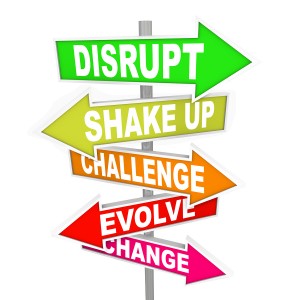Could it be that your company is going out of business and nobody knows it? I ask that simply because there are many people now talking about “disruptive technologies”. What are those? Think of it as a trend that will never go away. McKinsey published a 2013 research report that it summarises in this way:
Disruptive technologies: Advances that will transform life, business, and the global economy, a report from the McKinsey Global Institute, cuts through the noise and identifies 12 technologies that could drive truly massive economic transformations and disruptions in the coming years. The report also looks at exactly how these technologies could change our world, as well as their benefits and challenges, and offers guidelines to help leaders from businesses and other institutions respond.
The authors of the report [link] — James Manyika, Michael Chui, Jacques Bughin, Richard Dobbs, Peter Bisson and Alex Marrs — list trends in fields such as advanced robotics and next-generation genomics. You can see a quick summary of their work on Business Insider [link]. But it’s not the trends, alone, that are fascinating. It’s the potential impact on companies that thrive on existing technologies that really raises (or should raise) your concern. Say the authors:
We estimate that, together, applications of the 12 technologies discussed in the report could have a potential economic impact between $14 trillion and $33 trillion a year in 2025. This estimate is neither predictive nor comprehensive. It is based on an in-depth analysis of key potential applications and the value they could create in a number of ways, including the consumer surplus that arises from better products, lower prices, a cleaner environment, and better health.
 In other words, many new technologies (and those firms that develop them) will start generating trillions in revenue, most likely decimating the income streams of those companies stuck in the past.
In other words, many new technologies (and those firms that develop them) will start generating trillions in revenue, most likely decimating the income streams of those companies stuck in the past.
For the last few years, MIT has been tracking the 50 companies most likely to lead disruptions in the marketplace. Their 2013 list [link] reveals some familiar names (Apple, Facebook, Siemens, Toyota) and many you might not have heard from — yet. For example, MIT lists Aquion Energy, Coursera, MC10 and uniQure. Say who?
I also found it interesting that some far-sighted individuals are thinking about disruption. For example, have you seen Michael Phillip’s blog on “Five Corporation-Crushing Disruptive Technologies That Will Empower the Masses”? [link] As is true of so many blogs, you will find a strong point of view here and some strong opinions. He sees disruptive technologies downgrading the role of corporations in people’s lives:
This next wave of disruptive tech will decentralize power, putting it back into the hands of the people. It will usher in a time where we will make our own belongings, fund our own ventures and master our own bodies and consciousnesses. What makes this all the sweeter is that huge corporations and governments are either ignorant to it, or powerless to stop the radical change that’s coming.
When he cites graphene as one of those technologies, it’s easy to start thinking about where this single scientific advance will lead all of us. Quite possibly, we will all be far more empowered than we are now.
I stand by what I said in my post on “Imagine! (Or Else!)” [link]. Indeed, your company may be a disruptive leader and your work and career are thus, relatively, safe. But what if your company will find itself, sooner rather than later, crushed? I find the prospect, for many companies, probable and not just possible. But this does not have to be taken as a threat, for in all this lie great opportunities for those willing to lead. As I write in my earlier post:
There’s an important nextsensing lesson in all these inventions: no matter your current marketplace position or advantage, and no matter how good you (think you) are, someone — somewhere (and not anymore just in a Silicon Valley garage) — is probably working on an idea that will fundamentally disrupt your world. It is not simply about someone inside your firm inventing an odd niche product or service occasionally. Rather, it’s about the need for a healthy degree of restlessness that must be established and maintained by leaders in every organisation because there will be a new way of doing things sooner rather than later, and it would be nice if your firm had a hand in a few of the bigger and strategically important new things.
In disruptive times, alertness to new problems and new possibilities is today’s equivalent to “necessity is the mother of invention”. It all starts with alertness to people’s wants and needs. Great opportunities flow from there.
